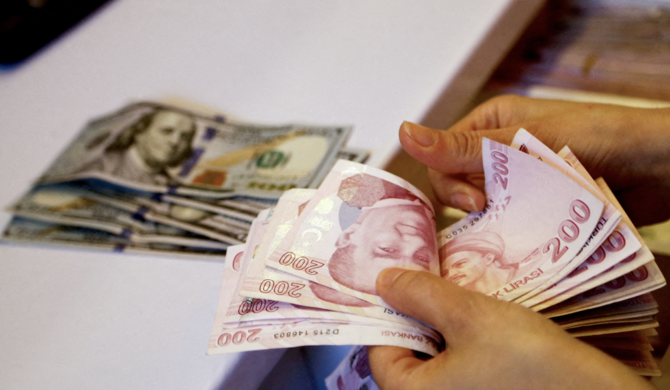
- ARAB NEWS
- 01 Jul 2025

ANKARA: As Turkiye heads to a critical runoff vote to determine the nation’s president on Sunday, the central bank’s net foreign exchange reserves turned negative for the first time since 2002, dropping to minus-$151.3 million on May 19, due to increased market demand since the first round of the elections.
Experts say the current course in Turkiye, one of the world’s 20 largest economies, is connected to the controversial efforts of the incumbent government to win the elections by trying to hold the Turkish lira relatively steady with unorthodox policies and low interest rates amid high inflation.
However, keeping interest rates low also bears risky consequences despite its short-term advantages.
Selva Demiralp, a professor of economics at Koc University in Istanbul, said: “The central bank’s foreign currency reserves are meant to be a buffer during times of temporary volatility. They are not supposed to be used as a monetary policy tool in a free exchange rate system, simply because they are of limited supply.”
“Turkiye’s central bank has done the latter, however, and tried to offset the adverse effects of a low interest rate environment on the exchange rate by selling foreign currency reserves. As of now, these reserves are mostly depleted with gross reserves of around $100 billion and net reserves are close to (zero). After adjusting for swap agreements, the net reserves become deeply negative around (minus) $60 billion,” she told Arab News.
For an economy with a monthly current account deficit of around $8 billion, Demiralp thinks that the negative value of net reserves is alarming because it can cause disruptions in trade, considering that Turkiye relies on imports of intermediate goods in its production structure.
“Hence potential disruptions in supply chains due to lack of foreign exchange would not only affect Turkish production but would also affect the production of our trade partners in today’s global production network where most countries are interconnected through supply chains,” she said.
“Because the presence of foreign investments in Turkiye is rather minimal at the moment, it would not make much of a change regarding the foreign investors’ hesitance about entering Turkish markets. The decline in reserves and the consequent increase in Turkiye’s risk premium would increase the external borrowing costs of the domestic investors, however,” Demiralp said.
There are still uncertainties over whether the new government will stick with the current economic program of encouraging exports and economic growth with rate cuts and strictly monitored foreign exchange markets, or switch to another model with gradual interest rate hikes.
Kemal Kilicdaroglu, the opposition’s contender against President Recep Tayyip Erdogan, has promised a return to orthodox and investor-friendly economic policies with rate hikes.
However, even if he comes to power, the parliamentary majority will still be in the hands of Erdogan’s Justice and Development Party and its alliance, which will restrict the ability to manage a new financial program.
Sky-high inflation rates reaching 44 percent and depleted foreign reserves still pose significant challenges. The country will also face local elections next March that requires the need to sustain economic stability for some time.
However, Erdogan recently told CNN he would not change his economic policy if he wins a third presidential term. This means the currency might sink further, while more restrictions might also be placed on foreign currency withdrawals.
Economist Demiralp believes that the likely scenario after the elections is a gradual hiking of rates to ease the pressures on the foreign exchange market and encourage capital inflows.
“This goes against the signals and the guidance by government officials. Nevertheless, the alternative to the orthodox policies is stricter capital controls and I believe the costs of that route would far outweigh the costs of a tightening cycle on the Turkish economy,” she added.
The national currency continues slipping to record lows against the euro and the US dollar. It has lost almost 80 percent of its value against the dollar over the past five years.
Russia recently agreed to delay some of Turkiye’s payment for natural gas imports — a $600-million bill — to next year, while in March Saudi Arabia deposited $5 billion in Turkiye’s central bank.
Following Sunday’s elections, among the winning side’s top priorities would be to address skyrocketing inflation and the plummeting lira.
Emre Akcakmak, a Dubai-based Turkish economist and senior consultant at East Capital, said that regardless of the winning candidate, there are several issues that the new government must address urgently.
“The central bank’s declining net international reserves, growing short-term external debt, large current account deficit, high inflation, and a massive pile of foreign currency-protected deposits are just a few of the many,” he told Arab News.
According to Akcakmak, although the net international reserves have fallen into negative territory, the central bank still has some room to delay major action, considering the usable gross reserves.
“However, time is ticking away, and potential troubles are deepening as long as there is no decisive policy response,” he said.
The incumbent government of Turkiye has long rejected any suggestion of a rescue package from the International Monetary Fund as an external solution to its financing needs, and reaching an agreement with the IMF is still not on its agenda.
“There is a lot of talk about the IMF as an external solution, but the reality is that the international reserves are already supported by external sources, given significant foreign central bank swaps and deposits,” said Akcakmak.
“A solution should ultimately come from within, with a strong and comprehensive policy response that takes a long-term view, rather than solely addressing the immediate challenges,” he added.
In April, the IMF raised Turkiye’s economic growth forecast to 3.6 percent for next year but lowered the country’s economic growth forecast for this year to 2.7 percent.